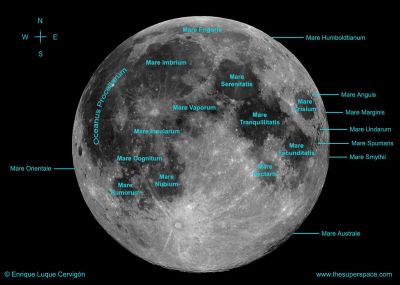Difference between revisions of "Mare"
(Created page with "<div id="content_view" class="wiki" style="display: block"> =Mare (sea)= (glossary entry; plural = '''Maria''')<br /> <div id="toc"> =Table of Contents= <div style="margi...") |
|||
| (2 intermediate revisions by the same user not shown) | |||
| Line 2: | Line 2: | ||
=Mare (sea)= | =Mare (sea)= | ||
(glossary entry; plural = '''Maria''')<br /> <div id="toc"> | (glossary entry; plural = '''Maria''')<br /> <div id="toc"> | ||
| − | + | [http://www.lpod.org/coppermine/albums/userpics/Moon%20Maria%20List.jpg [[Image:Normal_Moon%20Maria%20List.jpg|external image normal_Moon%20Maria%20List.jpg]]]<br /> ''[http://lpod.org/coppermine/displayimage.php?pos=-3297 Enrique Luque Cervigón]'' A labeled view the nearside maria<br /> <br /> | |
| − | |||
==Description== | ==Description== | ||
| − | One of 18 different categories of lunar features recognized in the current system of [ | + | One of 18 different categories of lunar features recognized in the current system of [[IAU%20nomenclature|IAU nomenclature]]. The word means "sea" in Latin and the IAU defines a '''mare''' as a "large circular plain". The term is used as prefix to the feature name.<br /> <br /> |
==Additional Information== | ==Additional Information== | ||
| − | * The largest of the maria are readily visible to the naked eye, and have been known since ancient times. The notion that they are literally "seas" (of water) has frequently been attributed to [ | + | * The largest of the maria are readily visible to the naked eye, and have been known since ancient times. The notion that they are literally "seas" (of water) has frequently been attributed to [[Galileo%20Galilei|Galileo Galilei]]. However, he simply said (in his book ''Sidereus Nuncius'' (1610)) that he thought that if the Earth were similarly observed from space it would show a similar pattern of dark and light with the seas (the Earth's "mare") looking dark, and the landmasses light. Galileo referred to all dark areas on the Moon (craters and mare alike) as "spots" and he did not infer that either of these were liquid surfaces, and he did not call them "mare". <span class="membersnap">- Jim Mosher</span> |
| − | * There are only two officially named lunar maria never visible from Earth: [ | + | * There are only two officially named lunar maria never visible from Earth: [[Mare%20Ingenii|Mare Ingenii]] and [[Mare%20Moscoviense|Mare Moscoviense]]. |
<br /> | <br /> | ||
==List of Lunar Maria== | ==List of Lunar Maria== | ||
| − | * Click [ | + | * Click [[Lunar%20Mare|here]] for a list of mare pages in ''the-Moon Wiki'' |
* See also the [http://planetarynames.wr.usgs.gov/jsp/FeatureTypesData2.jsp?systemID=3&bodyID=11&typeID=25&system=Earth&body=Moon&type=Mare,%20maria&sort=ALong&show=Fname&show=Lat&show=Long&show=Diam&show=Stat&show=Orig official IAU list] for this category | * See also the [http://planetarynames.wr.usgs.gov/jsp/FeatureTypesData2.jsp?systemID=3&bodyID=11&typeID=25&system=Earth&body=Moon&type=Mare,%20maria&sort=ALong&show=Fname&show=Lat&show=Long&show=Diam&show=Stat&show=Orig official IAU list] for this category | ||
<br /> | <br /> | ||
| Line 23: | Line 22: | ||
<br /> <br /> | <br /> <br /> | ||
---- | ---- | ||
| − | + | </div> | |
Latest revision as of 02:03, 16 April 2018
Contents
Mare (sea)
(glossary entry; plural = Maria)
Enrique Luque Cervigón A labeled view the nearside maria
Description
One of 18 different categories of lunar features recognized in the current system of IAU nomenclature. The word means "sea" in Latin and the IAU defines a mare as a "large circular plain". The term is used as prefix to the feature name.
Additional Information
- The largest of the maria are readily visible to the naked eye, and have been known since ancient times. The notion that they are literally "seas" (of water) has frequently been attributed to Galileo Galilei. However, he simply said (in his book Sidereus Nuncius (1610)) that he thought that if the Earth were similarly observed from space it would show a similar pattern of dark and light with the seas (the Earth's "mare") looking dark, and the landmasses light. Galileo referred to all dark areas on the Moon (craters and mare alike) as "spots" and he did not infer that either of these were liquid surfaces, and he did not call them "mare". - Jim Mosher
- There are only two officially named lunar maria never visible from Earth: Mare Ingenii and Mare Moscoviense.
List of Lunar Maria
- Click here for a list of mare pages in the-Moon Wiki
- See also the official IAU list for this category
LPOD Articles
Bibliography
- Baldwin, R. B. (1974). On the Origin of the Mare Basins - Lunar Science Conference, 5th, Houston, Tex., March 18-22, 1974, Proceedings. Volume 1. (A75-39540 19-91) New York, Pergamon Press, Inc., 1974, p. 1-10. 1974.
- Mackin, J. Hoover. 1969. Origin of Lunar Maria. Geological Society of America Bulletin. v. 80, no. 5, pp. 735-748.